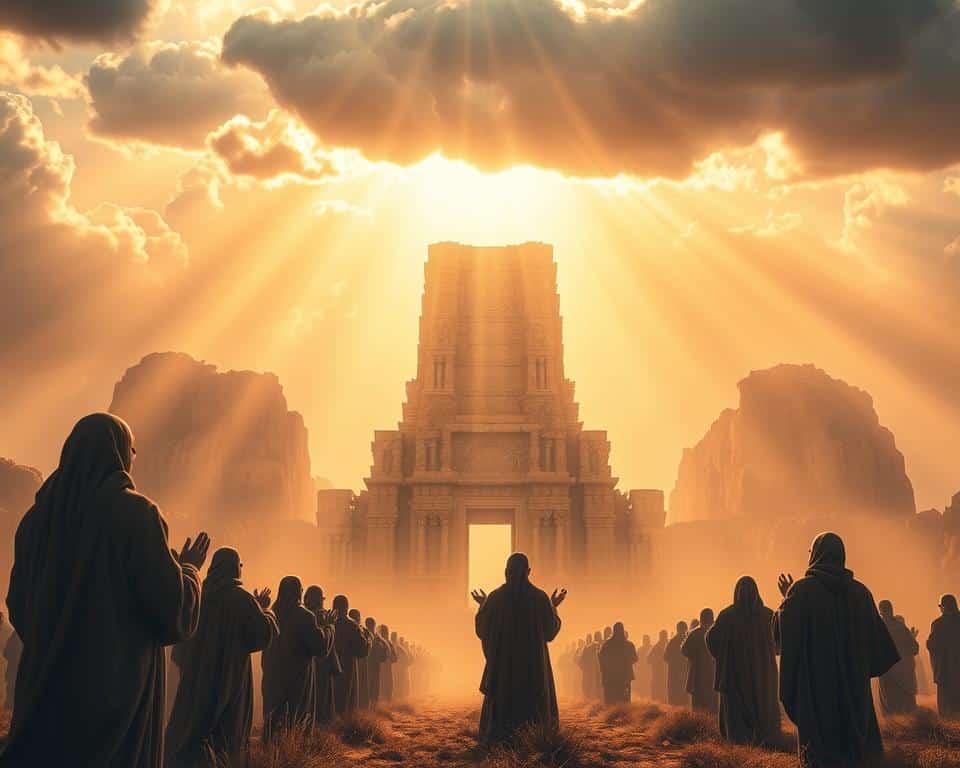Have you ever wondered how ancient predictions could hold the key to understanding truth today? The Bible contains over 300 Old Testament prophecies that point directly to Jesus. These predictions, written centuries before His birth, were fulfilled with astonishing accuracy in the New Testament.
Mathematician Peter Stoner calculated the odds of just eight of these prophecies fulfilled by chance at 1 in 100,000,000,000,000,000. Such precision isn’t random—it’s divine. These fulfilled predictions not only confirm Jesus as the Messiah but also affirm the reliability of Scripture.
Exploring these prophecies can deepen your faith and strengthen your understanding of God’s plan. Let’s dive into how these ancient words continue to inspire hope and truth today.
Introduction to Biblical Prophecy
Prophets in the Bible were more than messengers—they were God’s voice to His people. These individuals were chosen to deliver His words, whether to guide, warn, or reveal future events. Their role was unique, bridging the gap between God and humanity.

What is a Biblical Prophet?
A biblical prophet was God’s authorized spokesperson. In Exodus 7:1, God tells Moses, “I have made you like God to Pharaoh.” This shows the authority given to prophets. Unlike modern fortune-tellers, true prophets always pointed people back to God and His truth.
Prophets had a dual role: forthtelling and foretelling. Forthtelling involved speaking God’s truth to the current generation. Foretelling was predicting future events, often as a sign of God’s sovereignty. Both roles were vital in revealing God’s plan.
The Role of Prophecy in Scripture
Prophecy in the Testament serves as a testament to God’s control over history. Deuteronomy 18:18-22 sets a strict test for prophets: their predictions must be 100% accurate. This standard ensures only genuine prophets speak for God.
Isaiah’s prophecy about the Assyrian siege (Isaiah 37:33-36) is a powerful example. He foretold the enemy’s defeat, and it happened exactly as he said. This immediate fulfillment reinforced the trust in God’s words.
“I am God, and there is none like me, declaring the end from the beginning.”
This verse highlights God’s sovereignty. Through prophecy, He declares His plans, proving He is in control of all things. These prophecies are not just historical records—they are reminders of His faithfulness and power.
The Power of Predictive Prophecy
What makes Biblical predictions so powerful and unique? Unlike human guesswork, these foretold events are precise and intentional. They reveal God’s sovereignty and His control over history. Through predictive prophecy, God authenticates His word and demonstrates His unmatched authority.

Understanding Predictive Prophecy
Predictive prophecy is God’s way of showing His power. In Isaiah 41:21-23, God challenges false gods to predict future events. Only He can declare the end from the beginning. This distinction sets Him apart from all other claims of divinity.
Amos 3:7 reminds us that God reveals His plans to His people. These predictions are not random but purposeful. They serve as a testament to His faithfulness and His ultimate plan for humanity.
Why Predictive Prophecy Matters
Fulfilled predictions validate Scripture’s divine origin. For example, Hosea 11:1 speaks of Israel’s exodus but also points to Jesus’ return from Egypt. This dual fulfillment shows the depth of God’s word.
- It builds trust in God’s ultimate plan.
- It confirms the reliability of the testament.
- It reminds us of His control over all things.
“Surely the Sovereign Lord does nothing without revealing His plan to His servants the prophets.”
Through prophecy, God invites us to trust Him. These ancient words are not just historical records—they are living reminders of His promises. They inspire hope and strengthen our understanding of His truth.
Prophecies About Jesus’ Birth
Centuries before Jesus’ birth, specific predictions were made about His arrival. These details, found in the Old Testament, were fulfilled with precision in the New Testament. They highlight God’s meticulous plan for the Messiah would come into the world.
The Prophecy of Bethlehem
Micah 5:2 foretold that the Messiah would be born in Bethlehem Judea. This prediction, made 700 years before Jesus’ birth, was fulfilled in Matthew 2:1-6. Even Herod’s priests confirmed this expectation, pointing to Bethlehem as the birthplace of the promised Savior.
The Virgin Birth Foretold
Isaiah 7:14 revealed that the Messiah would be born of a virgin. This prophecy emphasized the divine nature of Christ. Its fulfillment is recorded in Luke 1:35, where the angel Gabriel announced Jesus’ miraculous conception to Mary.
Mary and Joseph’s relocation to Egypt and return also fulfilled Hosea 11:1. These events underscore the accuracy of testament prophecies and their role in revealing God’s plan. Through these predictions, we see the truth of Scripture and the fulfillment of God’s promises.
“But you, Bethlehem Ephrathah, though you are small among the clans of Judah, out of you will come for me one who will be ruler over Israel.”
Prophecies About Jesus’ Lineage
The lineage of Jesus is a cornerstone of Biblical truth, connecting ancient promises to their fulfillment. From Abraham to David, His ancestry reveals God’s intentional design. These genealogies are more than records—they’re proof of God’s faithfulness and His plan for humanity.
Descendant of Abraham
In Genesis 12:3, God promised Abraham that through his offspring, all nations on earth blessed would be. This promise pointed to Jesus, the ultimate fulfillment. Matthew 1:1 opens with Jesus’ genealogy, intentionally tracing His lineage back to Abraham. This connection shows how God’s plan unfolded across generations.
Galatians 3:16 emphasizes the singular “seed” of Abraham, which is Christ. This focus highlights the precision of God’s promises. Jesus is the son abraham through whom all blessings flow, fulfilling the covenant made centuries earlier.
From the Line of David
In 2 Samuel 7:12-13, the lord said to David that his throne would be established forever. This Davidic covenant finds its fulfillment in Jesus. Luke 1:32-33 declares that Jesus will reign over the house of Jacob, and His kingdom will never end.
Isaiah 11:1 prophesied that a shoot would come from the stump of Jesse, David’s father. This prophecy is fulfilled in Luke 3:32, where Jesus is listed as a descendant of Jesse. Through these connections, Jesus is revealed as the promised ruler, the eternal King.
“I will establish the throne of his kingdom forever.”
These prophecies about Jesus’ lineage are not just historical details. They are living reminders of God’s faithfulness and His ultimate plan for salvation. Through them, we see the truth of Scripture and the fulfillment of His promises.
Prophecies About Jesus’ Ministry
Jesus’ ministry was marked by miracles and teachings that fulfilled ancient predictions. Every act and word pointed to His divine mission. These fulfillments are not just historical facts—they are reminders of God’s faithfulness and His perfect plan for humanity.
The Messiah’s Mission
In Luke 4:18-21, Jesus stood in the Nazareth synagogue and read from Isaiah 61:1-2. He declared that the Spirit of the Lord was upon Him to proclaim good news to the poor and set the captives free. This moment was a direct fulfillment of Isaiah’s prophecy, confirming Jesus as the promised Messiah.
Jesus also taught in parables, fulfilling Psalm 78:2. He used stories to reveal deep truths about God’s kingdom. This method was foretold centuries earlier, showing how God’s plan unfolded through Jesus’ teachings.
Healing the Sick and Raising the Dead
Isaiah 35:5-6 predicted that the Messiah would open the eyes of the blind and make the lame walk. Jesus fulfilled this through countless miracles, like healing the man born blind (John 9:1-7) and restoring the paralyzed man (Mark 2:1-12). These acts were not just displays of power—they were signs of His divine identity.
Jesus’ role as the Passover lamb was also foretold. Exodus 12:5 describes the lamb without blemish, and Hebrews 9:14 connects this to Jesus’ sacrifice. His death resurrection fulfilled the ultimate promise of redemption.
“He was given authority, glory, and sovereign power; all nations and peoples of every language worshiped Him.”
Through His ministry, Jesus showed that He is the son man with eternal dominion. These prophecies remind us that God’s word is true and His promises are unshakable.
Prophecies About Jesus’ Entry into Jerusalem
The moment Jesus entered Jerusalem was more than a historical event—it was a fulfillment of divine promises. This event, recorded in the testament, was foretold centuries earlier, showing God’s meticulous plan for His king.
Riding on a Donkey
Zechariah 9:9 predicted that the Messiah would enter Jerusalem riding on a donkey, a symbol of humility and peace. This prophecy was fulfilled in Matthew 21:1-7, where Jesus rode into the city on a colt. This act was intentional, contrasting with the expectations of a warrior king arriving on a horse.
Donkeys were often used by kings in times of peace, while horses symbolized war. By choosing a donkey, Jesus showed His mission was about peace and salvation, not conquest. This humble entry fulfilled Zechariah’s words and revealed His true purpose.
The Triumphal Entry
As Jesus entered Jerusalem, the people laid palm branches and cloaks on the road, shouting, “Hosanna to the Son of David!” (Matthew 21:9). Palm branches were a symbol of victory and triumph in Jewish tradition, showing their recognition of Jesus as the promised Messiah.
This moment also connected to Daniel’s 70 weeks prophecy, which foretold the timing of the Messiah’s arrival. The crowd’s declaration of Jesus as the “Son of David” fulfilled another layer of prophecy, confirming His identity as the eternal king.
“Rejoice greatly, Daughter Zion! Shout, Daughter Jerusalem! See, your king comes to you, righteous and victorious, lowly and riding on a donkey.”
Jesus’ entry into Jerusalem was a powerful reminder of God’s faithfulness. Every detail, from the donkey to the palm branches, pointed to His divine mission. These fulfilled predictions continue to inspire hope and trust in God’s word today.
Prophecies About Jesus’ Betrayal
The betrayal of Jesus was not a random act but a fulfillment of divine predictions. Every detail, from the thirty pieces of silver to Judas’ actions, was foretold in Scripture. These events show God’s control over history and His perfect plan for redemption.
Thirty Pieces of Silver
Zechariah 11:12-13 predicted that the Messiah would be betrayed for thirty pieces of silver. This exact amount was fulfilled in Matthew 26:15, where Judas negotiated with the chief priests for Jesus’ betrayal. The silver was later used to buy a potter’s field, as described in Matthew 27:3-10.
This field became a burial place for strangers, fulfilling the words of Zechariah. The irony is striking—the price of a slave in Exodus 21:32 was also thirty pieces of silver. Jesus, the King of kings, was valued at the price of a common slave.
The Betrayal by Judas
Judas’ betrayal was more than a tragic event—it was a fulfillment of Scripture. His actions led to Jesus’ arrest, but they also revealed the depth of God’s plan. Even Judas’ suicide was part of the mechanics of prophecy, as the money he returned was used to fulfill Zechariah’s words.
The testament prophecies about Jesus’ betrayal remind us that God’s word never fails. Every detail, from the silver to the field, was part of His divine plan. These events show that even in the darkest moments, God is in control.
“So they took the thirty pieces of silver, the price set on Him by the people of Israel, and they used them to buy the potter’s field, as the Lord commanded me.”
Through these fulfilled predictions, we see the truth of Scripture and the faithfulness of God. His word is unshakable, and His promises never pass away.
Prophecies About Jesus’ Death
The death of Jesus was not an accident but a fulfillment of divine promises. Scripture foretold every detail with remarkable precision, showing God’s perfect plan for redemption. These predictions, written centuries before, were fulfilled in the New Testament, confirming the truth of God’s word.
The Crucifixion Foretold
Psalm 22:16-18 describes the crucifixion in vivid detail. It speaks of pierced hands and feet, a scene fulfilled in John 19:18. The psalm also predicts the casting of lots for Jesus’ garments, which happened exactly as described in John 19:23-24. These details show the accuracy of Scripture.
Jesus’ cry, “I thirst” (John 19:28), fulfills Psalm 69:21. This moment reveals His humanity and the depth of His sacrifice. Even in His suffering, Jesus fulfilled every word of prophecy, proving His identity as the son of God.
Pierced Hands and Feet
Isaiah 53:5 foretold that the Messiah would be wounded for our transgressions. This prophecy was fulfilled when Jesus’ hands and feet were nailed to the cross. His wounds were not just physical—they were the means of our salvation.
Exodus 12:46 promised that none of the Passover lamb’s bones would be broken. This was fulfilled in John 19:36, where Jesus’ legs were left unbroken. These details highlight the meticulous fulfillment of God’s promises.
“They divide my garments among them and cast lots for my clothing.”
Through these fulfilled predictions, we see the truth of Scripture and the faithfulness of God. His word is unshakable, and His promises never fail. These prophecies remind us of His love and the hope we have in Christ.
Prophecies About Jesus’ Resurrection
The resurrection of Jesus stands as the cornerstone of Christian hope. It fulfills ancient predictions and reveals God’s power over death. Psalm 16:10 foretold that God’s son would not see decay, a promise fulfilled in the new testament.
In Matthew 28:5-6, an angel announced, “He is not here; He has risen!” This declaration confirmed the truth of Scripture. The empty tomb is a powerful reminder of God’s faithfulness and His control over all things.
Rising from the Dead
Jonah 1:17 foreshadowed Jesus’ resurrection with the three days in the fish’s belly. This event pointed to the three days Jesus would spend in the tomb. Even the posting of guards to prevent theft (Matthew 27:62-66) could not stop God’s plan.
Women were the first witnesses to the resurrection, fulfilling cultural norms of the time. Their testimony, recorded in Matthew 28:1-10, highlights God’s intentional design. These details show the meticulous fulfillment of Scripture.
The Empty Tomb
1 Corinthians 15:5-8 records Jesus’ appearances after His resurrection. He showed Himself to over 500 people, proving He was alive. These appearances strengthened the faith of His followers and confirmed His identity as the Messiah.
Daniel 9:26 foretold the “anointed one” would be cut off but not for Himself. This prophecy pointed to Jesus’ death and resurrection. Through these events, God’s plan for redemption was fulfilled.
“He is not here; He has risen, just as He said.”
The resurrection of Jesus is more than a historical event—it’s a living reminder of God’s promises. It inspires hope and strengthens our trust in His word.
Prophecies About Jesus’ Role in the Church
Jesus’ role in the church was foretold in Scripture, revealing His divine purpose. From the cornerstone to the Great Commission, every aspect of His work was part of God’s plan. These predictions show how Jesus established His kingdom and brought salvation to all people.
The Cornerstone of Faith
Isaiah 28:16 speaks of a cornerstone, a sure foundation laid by God. This prophecy points to Jesus, the rejected stone that became the cornerstone (Psalm 118:22). He is the foundation of the church, the way to salvation for all who believe.
In Matthew 16:18, Jesus declared, “I will build my church.” This statement fulfilled the prophecy of the cornerstone, showing His authority as the ruler of God’s kingdom. Through Him, the church stands firm, built on the truth of Scripture.
Building His Kingdom
At Pentecost, the Holy Spirit descended, fulfilling Joel 2:28-32. This event marked the beginning of the church’s mission to spread the gospel. The Great Commission (Matthew 28:18-20) connects to Daniel 7:14, where the son man is given authority over all nations.
Gentiles were included in God’s plan, fulfilling Genesis 12:3. Through Jesus, all nations are blessed, showing the universal scope of His kingdom. The Lord’s Supper also fulfills New Covenant prophecies, reminding us of His sacrifice and the promise of eternal life.
“On this rock I will build my church, and the gates of Hades will not overcome it.”
Jesus’ role in the church is a testament to God’s faithfulness. Every prophecy fulfilled reveals His perfect plan and the hope we have in Christ. Through His work, the church continues to grow, bringing salvation to all people.
The Mathematical Probability of Fulfilled Prophecies
The accuracy of Biblical predictions has been mathematically analyzed, revealing astonishing results. Peter Stoner, a mathematician, conducted groundbreaking research to calculate the odds of prophecies fulfilled in Scripture. His findings show that the likelihood of these events happening by chance is virtually impossible.
Peter Stoner’s Research
Stoner worked with 600 students to calculate the probability of eight specific prophecies about Jesus. Each prophecy was analyzed individually, and the odds of their fulfillment were determined. For example, the prediction that Jesus would be born in Bethlehem had a 1 in 280,000 chance of being fulfilled by chance alone.
When combined, the odds of all eight prophecies being fulfilled by coincidence were calculated at 1 in 10^17. To put this into perspective, Stoner used the analogy of covering the entire state of Texas with two-foot-tall silver dollars. The chance of randomly picking the marked one is the same as these prophecies being fulfilled by chance.
The Odds of Fulfillment
The statistical impossibility of these events happening by accident points to divine intervention. Stoner’s research highlights the meticulous design behind the testament prophecies. These calculations strengthen our faith in the truth of Scripture and God’s sovereignty over all things.
When considering the over 300 prophecies about Jesus, the cumulative effect is even more staggering. The precision and fulfillment of these predictions remind us that God’s word is unshakable. Through this research, we see how Scripture stands as a testament to His faithfulness and love for His people.
Prophecies About the Messiah’s Family Line
The family line of the Messiah was carefully detailed in Scripture, revealing God’s perfect plan. From the tribe of Judah to the lineage of Jesse, every detail points to Jesus as the promised Savior. These prophecies show how God’s promises were fulfilled with precision, strengthening our trust in His word.
From the Tribe of Judah
In Genesis 49:10, Jacob prophesied that the ruler would come from the tribe of Judah. This scepter prophecy was fulfilled in Jesus, as recorded in Luke 3:33. Judah’s descendants were chosen to carry the promise of the messiah would bring salvation to all nations.
Ruth’s story also plays a key role in preserving this lineage. Her faithfulness ensured the Davidic line continued, leading to Jesus. This connection highlights God’s intentional design in fulfilling His promises.
Descendant of Jesse
Isaiah 11:1 foretold that a shoot would come from the stump of Jesse. This prophecy points to Jesus as the descendant of Jesse, David’s father. In Luke 3:23-38, Jesus’ genealogy traces back to Jesse, confirming His identity as the promised son abraham.
God’s plan was not limited to one family but extended to all earth blessed through Jesus. His lineage shows how God’s promises are fulfilled across generations, reminding us of His faithfulness.
“The scepter will not depart from Judah, nor the ruler’s staff from between his feet, until he to whom it belongs shall come.”
Through these prophecies, we see how God’s word is unshakable. Every detail in Jesus’ family line points to His divine mission and the hope we have in Him.
Prophecies About the Messiah’s Birthplace
The birthplace of the Messiah was no accident—it was a divine declaration. Scripture pinpointed the exact location centuries in advance, showing God’s meticulous plan. Bethlehem, a small and seemingly insignificant town, was chosen for a royal purpose.
Micah’s Prediction
In Micah 5:2, the prophet foretold that the Messiah would be born in Bethlehem Judea. This prediction, made 700 years before Jesus’ birth, highlighted God’s intentional design. Bethlehem, though small among the clans of Judah, was destined to be the birthplace of the king.
Herod, troubled by the news of a newborn king, consulted the religious leaders. They confirmed Micah’s prophecy, pointing to Bethlehem as the Messiah’s birthplace. This moment underscores the accuracy of testament prophecies and their role in revealing God’s plan.
Fulfillment in Bethlehem
Mary and Joseph’s journey to Bethlehem was unexpected but necessary. The Roman census required them to travel to Joseph’s ancestral home, fulfilling the prophecy. This connection to David’s birthplace, as recorded in Matthew 1:1, shows the depth of God’s plan.
Jesus’ upbringing in Nazareth contrasts with His birth in Bethlehem. This contrast highlights the humility of the Messiah, who came not as a conquering king but as a servant. Through these details, we see the truth of Scripture and the fulfillment of God’s promises.
“But you, Bethlehem Ephrathah, though you are small among the clans of Judah, out of you will come for me one who will be ruler over Israel.”
Bethlehem’s role in the Messiah’s birth reminds us of God’s faithfulness. Every detail, from the prophecy to its fulfillment, points to His sovereignty. Through these events, we see the truth of Scripture and the hope we have in Christ.
Prophecies About the Messiah’s Mission
The mission of the Messiah was foretold with clarity, revealing God’s plan for humanity. Scripture details how Jesus would bring justice and proclaim good news to all people. These predictions show the depth of God’s love and His desire to redeem the world.
Bringing Justice to the Nations
Isaiah 42:1-4 describes the Messiah as a servant who will bring justice to the nations. Unlike a conquering king, Jesus came as a humble servant, fulfilling this prophecy. His mission was not to overthrow earthly powers but to establish God’s kingdom of love and righteousness.
In Matthew 12:18-21, Jesus’ ministry is connected to Isaiah’s words. He brought hope to the oppressed and healing to the broken. This fulfillment shows how God’s plan includes all people, both Jews and Gentiles.
Proclaiming Good News
In Luke 4:18-21, Jesus stood in the Nazareth synagogue and read from Isaiah 61. He declared that He was anointed to proclaim good news to the poor and set the captives free. This moment was a direct fulfillment of prophecy, confirming His divine mission.
The “acceptable year” mentioned in Isaiah 61 connects to the Jubilee, a time of freedom and restoration. Jesus’ ministry fulfilled this theme, bringing spiritual freedom to all who believe. His message was not limited to one group but extended to all nations, fulfilling Isaiah 49:6.
“The Spirit of the Lord is on me, because He has anointed me to proclaim good news to the poor.”
Through His mission, Jesus showed that He is the son man, the promised Savior. His life and teachings reveal the way to salvation and the hope we have in God’s promises. These prophecies remind us of His love and the truth of Scripture.
Prophecies About the Messiah’s Suffering
The suffering of the Messiah was foretold with striking detail, revealing God’s plan for redemption. Scripture describes the pain and rejection Jesus endured, showing how every moment was part of a divine design. These testament prophecies remind us of God’s sovereignty and His love for His people.
Despised and Rejected
Isaiah 53:3 paints a vivid picture of the Messiah’s rejection. It says, “He was despised and rejected by mankind, a man of suffering, and familiar with pain.” This prophecy was fulfilled when Jesus faced hostility in His hometown of Nazareth. In Luke 4:28-29, the crowd tried to throw Him off a cliff, showing the depth of their rejection.
Psalm 22:1 echoes this suffering with Jesus’ cry on the cross: “My God, my God, why have you forsaken me?” This moment reveals the son’s anguish and the weight of humanity’s sin He bore. These predictions show that even in His darkest hour, Jesus fulfilled God’s word.
The Suffering Servant
Isaiah 53:7 describes the Messiah as a silent lamb led to slaughter. Jesus fulfilled this by remaining silent during His false trial, as foretold in Psalm 27:12. He did not defend Himself, showing His willingness to endure judgment for our sake.
Even the vinegar offered to Jesus on the cross fulfilled Psalm 69:21. These details highlight the precision of God’s plan. The messiah would suffer, but His suffering brought redemption to all who believe.
“He was oppressed and afflicted, yet He did not open His mouth; He was led like a lamb to the slaughter.”
Through these fulfilled predictions, we see the truth of Scripture and the depth of God’s love. The Messiah’s suffering was not in vain—it was the ultimate act of love and sacrifice.
Strengthening Faith Through Prophecy
The fulfillment of ancient predictions offers a unique way to deepen your understanding of Scripture. These divine “signatures” remind us that God’s word is trustworthy and true. When we study these predictions, we see His hand at work in history and in our lives today.
How Prophecies Build Trust in Scripture
Prophecies serve as a powerful tool to confirm the truth of the Bible. When predictions written centuries ago are fulfilled with precision, it’s hard to dismiss them as mere coincidence. For example, the new testament records how Jesus fulfilled over 300 Old Testament predictions. This accuracy strengthens our confidence in God’s word. The sheer number of fulfilled prophecies in the New Testament not only underscores the authenticity of the scripture but also invites deeper exploration into the divine inspiration behind these writings. As believers reflect on these remarkable instances, they find assurance in the consistency and reliability of God’s promises throughout history. This reinforcement of faith encourages a more profound relationship with the teachings found in the Bible.
Peter Stoner’s research on the mathematical probability of fulfilled prophecies highlights their evidential value. His work shows that the odds of these events happening by chance are astronomically low. This is not just a matter of faith—it’s a matter of fact.
The Assurance of God’s Promises
Fulfilled predictions remind us that God’s promises are unshakable. In 2 Peter 1:19, we’re encouraged to pay attention to prophecy as a “light shining in a dark place.” These words remind us that God’s plans are reliable, even when things seem uncertain.
Romans 15:4 tells us that Scripture was written to give us hope and encouragement. When we see how God’s promises have been fulfilled in the past, we can trust that His future promises will also come to pass. This assurance is a cornerstone of our faith.
“For everything that was written in the past was written to teach us, so that through the endurance taught in the Scriptures and the encouragement they provide we might have hope.”
Studying Messianic prophecies can be a transformative experience. It connects us to the people of the Bible and shows how God’s plan unfolds across generations. As we explore these resources, we’re reminded of the hope we have in Christ’s return. This Advent hope inspires us to live with purpose and confidence in God’s word.
The Unshakable Truth of Biblical Prophecy
The fulfillment of ancient predictions offers a unique way to deepen your understanding of Scripture. These divine “signatures” remind us that God’s word is trustworthy and true. When we study these predictions, we see His hand at work in history and in our lives today.
The cumulative weight of prophetic evidence points to Christ as the ultimate fulfillment center. Every detail, from His birth to His resurrection, confirms the reliability of the testament. This is not just a matter of faith—it’s a matter of fact.
Invite others to explore these truths. Sharing the evidence of fulfilled predictions can strengthen their trust in Scripture. It’s a powerful way to point them to the hope found in Christ.
As we look to the future, we can be confident in God’s promises. The return of the son is the ultimate fulfillment we eagerly await. Let this truth inspire you to live with purpose and confidence in His word.





